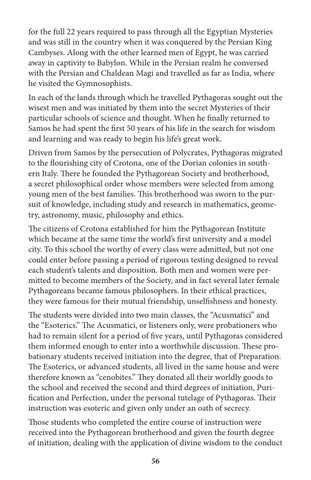for the full 22 years required to pass through all the Egyptian Mysteries and was still in the country when it was conquered by the Persian King Cambyses. Along with the other learned men of Egypt, he was carried away in captivity to Babylon. While in the Persian realm he conversed with the Persian and Chaldean Magi and travelled as far as India, where he visited the Gymnosophists. In each of the lands through which he travelled Pythagoras sought out the wisest men and was initiated by them into the secret Mysteries of their particular schools of science and thought. When he finally returned to Samos he had spent the first 50 years of his life in the search for wisdom and learning and was ready to begin his life’s great work. Driven from Samos by the persecution of Polycrates, Pythagoras migrated to the flourishing city of Crotona, one of the Dorian colonies in southern Italy. There he founded the Pythagorean Society and brotherhood, a secret philosophical order whose members were selected from among young men of the best families. This brotherhood was sworn to the pursuit of knowledge, including study and research in mathematics, geometry, astronomy, music, philosophy and ethics. The citizens of Crotona established for him the Pythagorean Institute which became at the same time the world’s first university and a model city. To this school the worthy of every class were admitted, but not one could enter before passing a period of rigorous testing designed to reveal each student’s talents and disposition. Both men and women were permitted to become members of the Society, and in fact several later female Pythagoreans became famous philosophers. In their ethical practices, they were famous for their mutual friendship, unselfishness and honesty. The students were divided into two main classes, the “Acusmatici” and the “Esoterics.” The Acusmatici, or listeners only, were probationers who had to remain silent for a period of five years, until Pythagoras considered them informed enough to enter into a worthwhile discussion. These probationary students received initiation into the degree, that of Preparation. The Esoterics, or advanced students, all lived in the same house and were therefore known as “cenobites.” They donated all their worldly goods to the school and received the second and third degrees of initiation, Purification and Perfection, under the personal tutelage of Pythagoras. Their instruction was esoteric and given only under an oath of secrecy. Those students who completed the entire course of instruction were received into the Pythagorean brotherhood and given the fourth degree of initiation, dealing with the application of divine wisdom to the conduct 56
Issuu converts static files into: digital portfolios, online yearbooks, online catalogs, digital photo albums and more. Sign up and create your flipbook.
